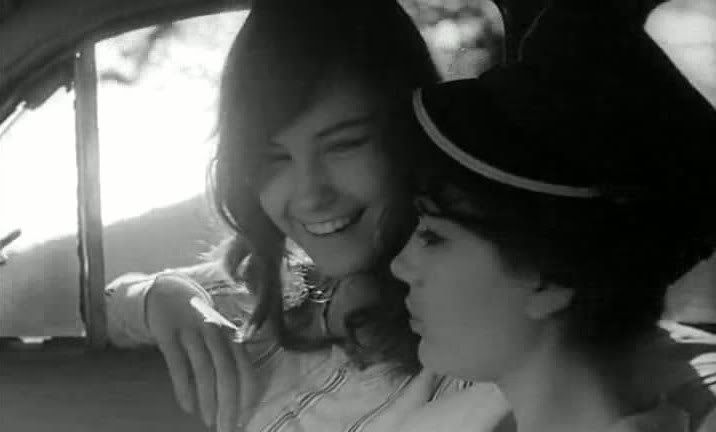 2011 is over, so it's time for my annual appraisal of the previous year. As usual, I've done an abysmal job of keeping up on the latest releases in film, so I'll be continuing my yearly tradition of doing a film list about the best films I saw for the first time during 2011, rather than the best films actually released in 2011. Each entry in the below list includes an excerpt from my writings on the film, where available.
2011 is over, so it's time for my annual appraisal of the previous year. As usual, I've done an abysmal job of keeping up on the latest releases in film, so I'll be continuing my yearly tradition of doing a film list about the best films I saw for the first time during 2011, rather than the best films actually released in 2011. Each entry in the below list includes an excerpt from my writings on the film, where available.As with last year, I've kept more up-to-date with new releases in music, so my music list, to be published on Wednesday, will compile my picks for the best albums of 2011.
Thanks to everyone who's read and followed this blog during the last year. I'm looking forward to another year of talking about film with you all.
35 Shots of Rum (Claire Denis, 2008) - "Denis builds the film's emotional foundation from such small, casual moments. The film is slow and soft, narratively slack and drifting, qualities that give its actual dramatic incidents a greater heft for arising out of the steady pulse of ordinary life. This is the work of a director self-assured in her own style, settling into the comfortable rhythms of her characters with a profound sense of quietude."
Adieu Philippine (Jacques Rozier, 1962) - "Adieu Philippine is about growing up into the world, about how the political affects even those who steadfastly ignore anything political, as these characters do. More than that, though, the film is about the joy of youth, about the joy of simply living. In its sensuality, its offhanded beauty, its extraction of the grace to be found in the quotidian, Adieu Philippine provides a more complete rejection of the ethos of war and death than any more explicit commentary could."
 Before the Revolution (Bernardo Bertolucci, 1964) - "In retrospect, Bertolucci's film is "before the revolution" that would briefly sweep across the western world in the late 60s, and his pessimistic ending — a declaration that, for aimless young people like Fabrizio, it's always "before" a revolution that never comes — is a bleak but accurate prediction of the disappointments to come."
Before the Revolution (Bernardo Bertolucci, 1964) - "In retrospect, Bertolucci's film is "before the revolution" that would briefly sweep across the western world in the late 60s, and his pessimistic ending — a declaration that, for aimless young people like Fabrizio, it's always "before" a revolution that never comes — is a bleak but accurate prediction of the disappointments to come."The Big Heat (Fritz Lang, 1953) - "[A] dark, tough noir, an intense crime thriller that moves at an unrelentingly brisk pace as it delves fearlessly into the darkness of its story. It is a remarkably adult film, never wincing away from the seedy truths at its core, and for the Hollywood of its era — even in the gritty world of the noir — it especially stands out."
By Night With Torch and Spear (Joseph Cornell, 1942) - "This is the world made strange, an ultimate surrealist statement. Ordinary industrial machinery, seen through a bright pink filter, seems to glow with otherworldly energy, and the men tending to these strangely vibrant, effervescent industrial playgrounds are like sorcerers, conjuring inexplicable phenomena."
Chungking Express (Wong Kar Wai, 1994) - "[A] hyperactive pastiche that evokes a very complicated stew of emotions, with Wong's familiar heartache and loneliness spiced with brighter, warmer emotions. The film is practically overflowing with style, bursting with visual ideas, ways of capturing the characters' internal states in colorful torrents of inventive imagery."
 Close-up (Abbas Kiarostami, 1990) - "[T]he subtle naturalism and observational aesthetic of the opening scenes gives way to a sense that things are being tweaked by the filmmakers, that not everything is necessarily as it seems. It's a reminder that the film's re-enactments are only playing at realism; they are in fact carefully arranged and scripted, based on real events but not in themselves 'real' or unmediated."
Close-up (Abbas Kiarostami, 1990) - "[T]he subtle naturalism and observational aesthetic of the opening scenes gives way to a sense that things are being tweaked by the filmmakers, that not everything is necessarily as it seems. It's a reminder that the film's re-enactments are only playing at realism; they are in fact carefully arranged and scripted, based on real events but not in themselves 'real' or unmediated."Garlic Is As Good As Ten Mothers (Les Blank, 1980) - "Like his friend and peer Werner Herzog... Blank seems to enjoy enthusiasm and passion for their own sakes, and his interest in the ephemera of garlic is contagious. He spends a great deal of time simply admiring the preparation of delicious-looking garlic-heavy dishes, until the distinctive odor of cooking garlic nearly seems to waft out of the screen. But more than that Blank suggests that what we choose to eat, and how we think about food, is a big part of what defines our identity."
Hugo (Martin Scorsese, 2011) - I won't say much here about Scorsese's unlikely stab at a 3D kids' movie — I'll be covering it in detail as part of an upcoming conversation with Jason Bellamy — except to say how surprised and delighted I was by it. It's an exuberant tribute to the director's love of cinema, made with a child's imagination and a fairy tale sensibility. Just a wonderful film, totally unlike anything Scorsese has done before, having more in common, in spirit, with his film-historical documentaries than his other fiction features.
Italianamerican (Martin Scorsese, 1974) - "Through their funny, charming stories, there emerges a portrait of the Italian-American experience in New York, and indeed the experience of all lower-class immigrants struggling to make lives for themselves in a new land. The cramped apartments, the large families, the kids working as soon as they're old enough rather than continuing in school, the wife supplementing her husband's income with sewing, the cooking, the sense of community: it's all told with such obvious love and tenderness and joy that the hardships and struggles don't seem nearly as important as the love of life and the hard-working values of these people."
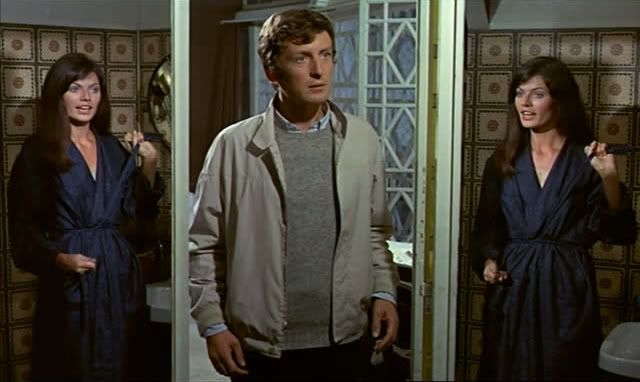 Je t'aime, je t'aime (Alain Resnais, 1968) - "Editing reaches its apex as an expressive form in Resnais' art, and especially in Je t'aime, je t'aime, a film whose structure very cleverly mirrors the editing process, embodying the art of editing in the film itself. It's one of Resnais' very best films, a sci-fi time travel masterpiece."
Je t'aime, je t'aime (Alain Resnais, 1968) - "Editing reaches its apex as an expressive form in Resnais' art, and especially in Je t'aime, je t'aime, a film whose structure very cleverly mirrors the editing process, embodying the art of editing in the film itself. It's one of Resnais' very best films, a sci-fi time travel masterpiece."Johnny Guitar (Nicholas Ray, 1954) - "It's a mad film, but its intense emotions are carefully controlled within a very rigid and powerful aesthetic framework. These oversized emotions, these bold feelings and words freighted with meaning, are straining against the boundaries of the Academy ratio frame, against the very form of the film which seeks, in vain, to hem them in. This tension is embodied in the jarring leaps between natural splendor and studio artificiality, necessitated at least in part by star Joan Crawford, a solidly artificial actress who refused to be filmed in closeup in nature. That might be a crippling limitation for a Western, except that Ray makes it into a weird virtue."
Los Angeles Plays Itself (Thom Andersen, 2003) - "[A]n examination of the relationship between the Los Angeles of the movies and the Los Angeles of reality, and of the the many different ways in which this city has been represented in the cinema. It's a work of film criticism that delves into the implications of various types of cinematic representation, but it also deals with history, with the social context in which the movies are made and in which a city changes, with architecture, with race and class, with the nature of urban identity and the specific image that Los Angeles projects of itself."
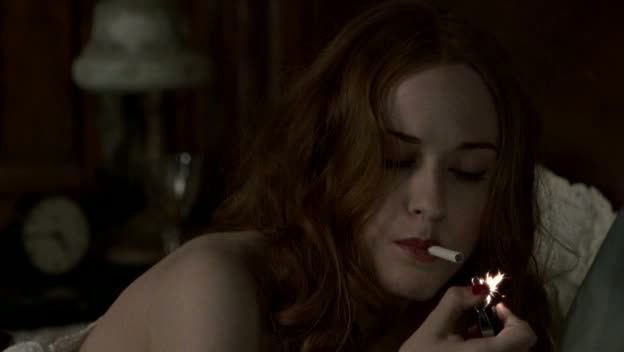 Mildred Pierce (Todd Haynes, 2011) - "Haynes, sticking close to the James M. Cain source novel, avoids the murder mystery genre plotting from the Joan Crawford movie, but his film's climax is even more lurid, even more melodramatic, rising to operatic excesses to stage this horrific primal scene."
Mildred Pierce (Todd Haynes, 2011) - "Haynes, sticking close to the James M. Cain source novel, avoids the murder mystery genre plotting from the Joan Crawford movie, but his film's climax is even more lurid, even more melodramatic, rising to operatic excesses to stage this horrific primal scene."Muriel, ou le temps d'un retour (Alain Resnais, 1963) - "It's as though these characters are trapped by this story, as trapped as the partying bourgeois of Buñuel's The Exterminating Angel, made the year before. Buñuel trapped his characters in a physical space, but Resnais encircles these people only with the boundaries of narrative and cliché. They're hemmed in by the story, by the editing, by the illogic of a film where everything seems to be perpetually on the verge of happening without ever quite getting there. The characters keep expressing their emotions, telling and retelling their stories, exploring a past that seems to be evasive and contradictory, but they never progress beyond their state of stasis, repeating the same actions and the same arguments over and over again."
Partie de campagne (Jean Renoir, 1936) - "[D]espite the film's rich humor and sensuous beauty, there's a strong undercurrent of sadness and despair running beneath its surface. Henri and Henriette spend a wonderful day on the river, as he rows her upstream towards a secluded spot where they sit together, listening to a nightingale's song, and inevitably wind up kissing amidst the reeds and tall grass. The sequence ends with a rainstorm that seems to portend the return of sadness after this brief respite of pleasure and holiday atmosphere."
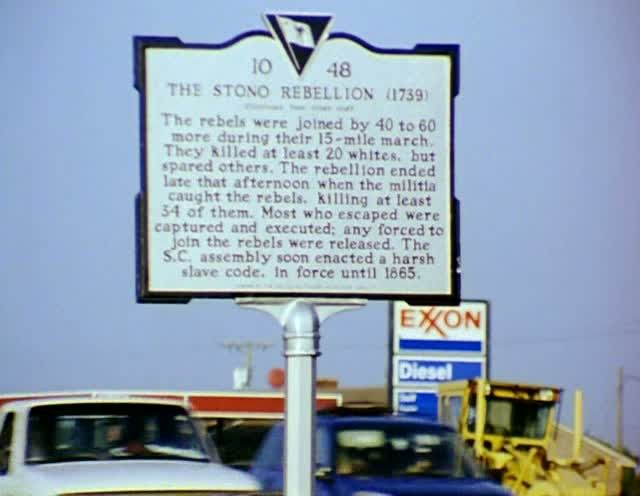 Profit Motive and the Whispering Wind (John Gianvito, 2007) - "The film, by juxtaposing monuments placed in prominent, public view with those that are more obscured, calls attention to the vagaries of history. Gianvito, without saying a word, is asking us to question why and how we remember, and what we remember: who gets enshrined in history books, who gets a big tourist site memorial, and who gets shuffled off into a corner, buried in an out-of-the-way cemetery with only a small marker to commemorate their lives and actions."
Profit Motive and the Whispering Wind (John Gianvito, 2007) - "The film, by juxtaposing monuments placed in prominent, public view with those that are more obscured, calls attention to the vagaries of history. Gianvito, without saying a word, is asking us to question why and how we remember, and what we remember: who gets enshrined in history books, who gets a big tourist site memorial, and who gets shuffled off into a corner, buried in an out-of-the-way cemetery with only a small marker to commemorate their lives and actions."The Prowler (Joseph Losey, 1951) - "[A] rich and idiosyncratic noir that explores the archetypal noir themes — greed, violence, ambition — in some unusual ways. The actual prowler of the opening, it turns out, is incidental to the story, a plot device and a red herring. The real prowler, the real creep, is the outsider who so desperately wants what he can only look at from afar, the guy who waits in the darkness, watching and desiring but separated from what he sees by seemingly insurmountable barriers."
Red Desert (Michelangelo Antonioni, 1964) - "This is a potent depiction of a world in which human connection seems impossible. At best, there are cheap and tawdry facsimiles of connection, like a party that Giuliana, Ugo and Corrado go to with some friends, where everyone talks incessantly about sex and the whole thing seems constantly on the verge of breaking out into an orgy. The orgy never happens, though, in part because all these upper-class blank slates seem too lazy, too bored, even to really have sex — their lascivious but empty chatter is contrasted against a young working class girl who says she'd 'rather do certain things than talk about them.'"
The Saragossa Manuscript (Wojciech Has, 1965) - "The film nests stories within stories within stories, erecting complex structures that burrow further and further away from reality, into the past, into ghost stories and tales of demons and devils and, especially, stories of love and romantic scheming. The film's text repeatedly comments, self-reflexively, on all these metafictional layers... The layered structure contributes to the sensation of being haunted, of passing from one absurd situation to another while losing one's grip on concrete reality."
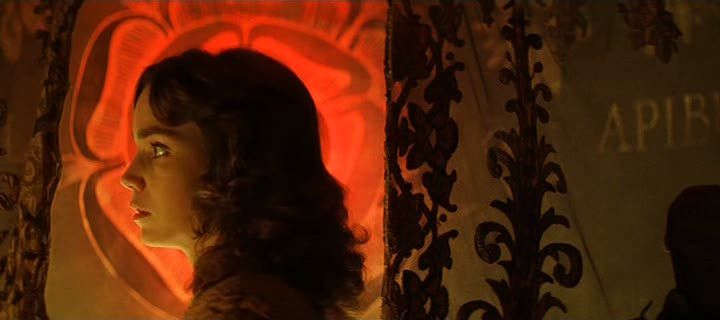 Suspiria (Dario Argento, 1977) - "Argento is excellent at using lighting and design to create the film's unsettling tone. He frequently focuses on closeups of the film's women... as they confront the strange events surrounding them. Faces mean a lot to Argento, faces in various contortions of terror and uncertainty, faces with eyes widened in fear and mouths gasping breathlessly. Agento films Suzy with colored lights washing across her face, especially hovering around her eyes, emphasizing her deer-in-headlights stare. It's obvious that he likes exploring the vulnerability of these women."
Suspiria (Dario Argento, 1977) - "Argento is excellent at using lighting and design to create the film's unsettling tone. He frequently focuses on closeups of the film's women... as they confront the strange events surrounding them. Faces mean a lot to Argento, faces in various contortions of terror and uncertainty, faces with eyes widened in fear and mouths gasping breathlessly. Agento films Suzy with colored lights washing across her face, especially hovering around her eyes, emphasizing her deer-in-headlights stare. It's obvious that he likes exploring the vulnerability of these women."The Tree, the Mayor and the Médiathèque (Eric Rohmer, 1993) - "These conversations circle around the same issues again and again, using this small local issue as a focal point for discussions that are often very dense and theoretical but never dry. There's something charming, even playful, in the film's endless dialogues... The quick-witted repartee is fluid and spontaneous, establishing the comfort of these lovers with one another and their intense interest in one another: they're talking about rural development and local electoral politics, but the subtext is much more personal."
Uncle Boonmee Who Can Recall His Past Lives (Apitchatchog Weerasethakul, 2010) - "[O]ne of Weerasethakul's richest films, weaving together the political, the spiritual, the fantastic and the deeply personal into a mysterious, moving, often funny account of facing mortality and confronting the sometimes uncomfortable truths of history. As such, the film looks both forward into the future and back into the past, and finds death in both directions, but even so it is not a bleak or dark work. It is instead warm and beautiful, evocative and sensual, flowing with the rhythms of daily life even as it examines the extraordinary and the shocking in both the real, violent history of the world and in the magical realms of myth, art and fantasy."
Under the Sun of Satan (Maurice Pialat, 1987) - "The style of the film, in examining these crises of faith and suffering, is stark and rigorous. Pialat's images are often dark but always clearly defined; even the shadows are crisp and hard. The most striking sequence is Donissan's walk from his parish to a nearby community where he's supposed to be visiting... Pialat's tranquil long shots seem to be mocking the priest, celebrating the beauty of nature even as the priest stumbles and staggers, weighed down by invisible burdens. At nightfall, these beautiful landscapes become dark and eerie, bathed in blue light."

17 comments:
Ed, thanks so much for this truly great list.
Some personal favorites show up -- The Big Heat, Before the Revolution, Chungking Express, and Partie de Campagne. But what excites me most are the works you point out that I still need to see. I can't wait, for instance, to check out Adieu Philippine, Je t'aime, je t'aime, Los Angeles Plays Itself, the Rohmer, the Pialat, and Red Desert (which, ironically, is already at home and will probably be the next film I watch).
Thanks, Ed, for always having such a fantastic and fresh perspective, and of course, for your one-of-a-kind articulations.
Ed, I like your idea of listing movies you've seen for the first time. For me, in some cases, it would eliminate trying to decide whether to include a film that I saw this year but technically wasn't released this year ("Carlos," for example). I'm delighted you got to see "Hugo" which is a favorite of mine in 2011 as well. Just want to say thanks for another year of great stuff, some of which always manages to slip into my Netflix queue (e.g., "The Saragossa Manuscript"). Out of curiosity, have you ever seen "Salvatore Giuliano"? It's a 1962 political docudrama about a Sicilian rebel, directed by Francesco Rosi. It's so obscure its IMDB message board has no comments, but I found out about it from Paul Schrader's "pantheon" essay and it's a fantastic film, well worth seeing if you haven't already.
Thanks, Jeffrey. Glad to hear some of these are your favorites as well, and of course I know you're a BIG admirer of Rohmer especially. I've been slowly getting more and more into him myself.
Craig, it's a necessity for me to do my film list this way, because I just really don't get out to new movies that often. I haven't seen Salvatore Giuliano, or any Rosi, though I remember hearing about him when Criterion released that and one or two of his other films. I'll have to make it a priority now.
A terrific list, Ed. LOS ANGELES PLAYS ITSELF - how cool was that?!
Wishing you a great year ahead, Ed, and thanks for this wonderful summation of your year at the movies.
Cheers!
Thanks a lot, JAFB. Los Angeles Plays Itself is pretty damn amazing indeed!
So glad you mande mention of Je t'aime Je t'aime. it's a very important Resnais, but scrcely discussed by anyone stateside.
Muriel is of course a Towering Masterpiece.
Thanks, David. Je t'aime, je t'aime is my favorite Resnais out of those I've seen so far. Just a remarkable film. And Muriel is not far behind.
Awesome roundup here, Ed. Partie de campagne is pretty darn near a perfect film in my book, I'm always glad to see that get a shout out. I'm glad you mention how sad it is; beneath the bright, gorgeous photography it really is one of the most quietly devastating movies I've ever seen.
So many I need to catch up with here: the Rohmer, the Rozier, and somehow I've still not seen Je t'aime, je t'aime, despite Resnais being one of my favorites.
Thanks a lot, Drew! Yeah, the Renoir is fantastic (hard to believe it was unfinished) and so heartbreaking. The rainstorm sequence is so good.
Lovely list. You've had such a good year. That's my favorite Renoir as well (and made my Top 20 discoveries from 2011). [i]Je T'aime, je t'aime[/i] is brilliant.
I really need to watch Muriel.
Thanks a lot, Charulata. I doubt you'll be disappointed in Muriel if you like Resnais and Je t'aime, je t'aime.
A gorgeous eclectic list to peruse through, Ed - it's reminded me of films I still want to see and somehow keep forgetting to watch (Adieu Philippine, By Night with Torch and Spear, Je t,aime je t'aime, Los Angeles Plays Itself, Italianamerican) and reminded me of films seen and much loved (Close-Up, The Saragossa Manuscript, The Red Desert, Profit Motive and the Whispering Wind, Under the Sun of Satan). The inclusion of Joseph Cornell's film is an apt reminder to me that I've only ever seen Rose Hobart and have hankering to see more of his films for years - I really must address that this year.
A list such as yours is perfectly balanced and perfectly timed, as it provides the impetus to keep diving into the wonderful treasure trove of film for another year. Hope you have another great year of viewing pleasures!
Thanks a lot, Michael. Cornell's a really fascinating and unique filmmaker, unlike pretty much anything else. Rose Hobart is great but I actually prefer a few of his less widely known films; he made a bunch of these weird little gems.
Thanks Ed for the terrific & eclectic list - something that other cinephiles can always make great use of. It has been a pleasure following your blog over the year. Hope that journey never ends :)
Thanks, Shubhajit!
Great and diverse presentation, and splendid capsule support as always. My own personal favorite is Renoir's PARTIE DE CAMPAGNE, one of the most lyrical of all films. But obviously there are many more here that have me nodding.
Thanks, Sam. Agreed about the Renoir, it's just a delight.
Post a Comment